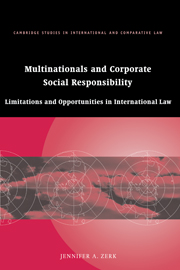 Multinationals and Corporate Social Responsibility
Multinationals and Corporate Social Responsibility Book contents
- Frontmatter
- Contents
- Preface
- Table of treaties, declarations and other international instruments
- Table of cases
- Table of statutes and statutory instruments
- List of abbreviations
- Introduction
- Part I Regulatory issues and problems
- 1 Multinationals and corporate social responsibility: a new regulatory agenda
- 2 Multinationals under international law
- 3 Multinationals under national law: the problem of jurisdiction
- Part II Home state regulation of multinationals
- Part III International regulation of multinationals
- Bibliography
- Index
- CAMBRIDGE STUDIES IN INTERNATIONAL AND COMPARATIVE LAW
3 - Multinationals under national law: the problem of jurisdiction
Published online by Cambridge University Press: 23 July 2009
- Frontmatter
- Contents
- Preface
- Table of treaties, declarations and other international instruments
- Table of cases
- Table of statutes and statutory instruments
- List of abbreviations
- Introduction
- Part I Regulatory issues and problems
- 1 Multinationals and corporate social responsibility: a new regulatory agenda
- 2 Multinationals under international law
- 3 Multinationals under national law: the problem of jurisdiction
- Part II Home state regulation of multinationals
- Part III International regulation of multinationals
- Bibliography
- Index
- CAMBRIDGE STUDIES IN INTERNATIONAL AND COMPARATIVE LAW
Summary
International law constraints on the jurisdiction of states have always posed difficulties for the regulation of multinationals. As discussed in chapter 2, international law is concerned fundamentally with relations between states. Multinationals are not traditional subjects of international law, and the extent to which international law now imposes obligations directly upon them is still controversial. This focus on states as the primary subjects of international law has led more than one commentator to doubt whether international law, as presently constructed, is properly equipped to deal with the challenges posed by international business. As multinationals span national boundaries, no one state has rights and obligations in respect of them. For these reasons, multinationals are often said to ‘fall through the cracks’ of the international regulatory system.
The aim of this chapter is to examine in more detail the concept of jurisdiction, as it applies to the social and environmental regulation of multinationals. As will be seen, different branches of law approach jurisdictional problems differently depending on whether the law is called upon to enforce public law or private law rights and obligations. Both are dominated by notions of ‘territoriality’. However, public international law (generally referred to in this book simply as ‘international law’), which governs the geographical scope of state power, tends to view jurisdiction in spatial terms, whereas in private international law jurisdiction is generally justified in terms of ‘connecting factors’ between the particular dispute and the ‘forum state’.
- Type
- Chapter
- Information
- Multinationals and Corporate Social ResponsibilityLimitations and Opportunities in International Law, pp. 104 - 142Publisher: Cambridge University PressPrint publication year: 2006
